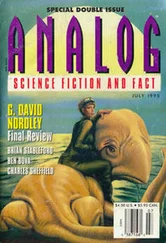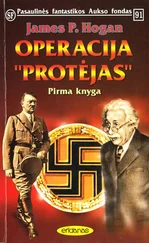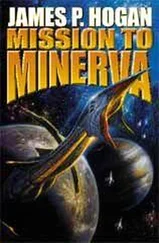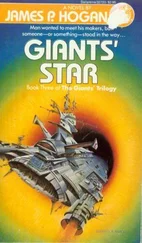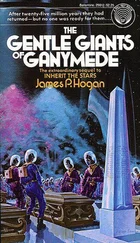James Hogan - Inherit the Stars
Здесь есть возможность читать онлайн «James Hogan - Inherit the Stars» весь текст электронной книги совершенно бесплатно (целиком полную версию без сокращений). В некоторых случаях можно слушать аудио, скачать через торрент в формате fb2 и присутствует краткое содержание. Жанр: Фантастика и фэнтези, на английском языке. Описание произведения, (предисловие) а так же отзывы посетителей доступны на портале библиотеки ЛибКат.
- Название:Inherit the Stars
- Автор:
- Жанр:
- Год:неизвестен
- ISBN:нет данных
- Рейтинг книги:3 / 5. Голосов: 1
-
Избранное:Добавить в избранное
- Отзывы:
-
Ваша оценка:
- 60
- 1
- 2
- 3
- 4
- 5
Inherit the Stars: краткое содержание, описание и аннотация
Предлагаем к чтению аннотацию, описание, краткое содержание или предисловие (зависит от того, что написал сам автор книги «Inherit the Stars»). Если вы не нашли необходимую информацию о книге — напишите в комментариях, мы постараемся отыскать её.
Inherit the Stars — читать онлайн бесплатно полную книгу (весь текст) целиком
Ниже представлен текст книги, разбитый по страницам. Система сохранения места последней прочитанной страницы, позволяет с удобством читать онлайн бесплатно книгу «Inherit the Stars», без необходимости каждый раз заново искать на чём Вы остановились. Поставьте закладку, и сможете в любой момент перейти на страницу, на которой закончили чтение.
Интервал:
Закладка:
Caldwell led him on further. "How would you suggest we go about that?"
Hunt wondered if this was a direct cue. He decided to risk it. "You could try taking a closer look at this." He drew a sheet of paper out from the folder in front of him and slid it across to the center of the table. The paper showed a complicated tabular arrangement of Lunarian numerals.
"What’s that?" asked a voice.
"It’s from one of the pocket books," Hunt replied. "I think the book is something not unlike a diary. I also believe that that"-he pointed at the sheet-"could well be a calendar." He caught a sly wink from Lyn Garland and returned it.
"Calendar?"
"How d’you figure that one?"
"It’s all gobbledygook."
Danchekker stared hard at the paper for a few seconds. "Can you prove it’s a calendar?" he demanded.
"No, I can’t. But I have analyzed the number pattern and can state that it’s made up of ascending groups that repeat in sets and subsets. Also, the alphabetic groups that seem to label the major sets correspond to the headings of groups of pages further on-remarkably like the layout of a diary."
"Hmmph! More likely some form of tabular page index."
"Could be," Hunt granted. "But why not wait and see? Once the language has unraveled a bit more, it should be possible to cross-check a lot of what’s here with items from other sources. This is the kind of thing that maybe we ought to be a little more open-minded about. You say Charlie comes from Earth; I say he might. You say this is not a calendar; I say it might be. In my estimation, an attitude like yours is too inflexible to permit an unbiased appraisal of the problem. You’ve already made up your mind what you want the answers to be."
"Hear, hear!" a voice at the end of the table called.
Danchekker colored visibly, but Caldwell spoke before he could reply.
"You’ve analyzed the numbers-right?"
"Right."
"Okay, supposing for now it’s a calendar-what more can you tell us?"
Hunt leaned forward across the table and pointed at the sheet with his pen.
"First, two assumptions. One: the natural unit of time on any world is the day-that is, the time it takes the planet to rotate on its axis…"
"Assuming it rotates," somebody tossed in.
"That was my second assumption. But the only cases we know of where there’s no rotation-or where the orbital period equals the axial period, which amounts to the same thing-occur when a small body orbits close to a far more massive one and is swamped by gravitational tidal effects, like our Moon. For that to happen to a body the size of a planet, the planet would have to orbit very close to its parent star-too close for it to support any life comparable to our own."
"Seems reasonable," Caldwell said, looking around the table. Various heads were nodding assent. "Where do we go from there?"
"Okay," Hunt resumed. "Assuming it rotates and the day is its natural unit of time-if this complete table represents one full orbit around its sun, there are seventeen hundred days in its year, one entry for each."
"Pretty long," someone hazarded.
"To us, yes: at least, the year-to-day ratio is big. It could mean the orbit is large, the rotational period short, or perhaps a bit of both. Now look at the major number groups-the ones tagged with the heavy alphabetic labels. There are forty-seven of them. Most contain thirty-six numbers, but nine of them have thirty-seven-the first, sixth, twelfth, eighteenth, twenty-fourth, thirtieth, thirty-sixth, forty-second, and forty-seventh. That seems a bit odd at first sight, but so would our system to someone unfamiliar with it. It suggests that maybe somebody had to do a bit of fiddling with it to make it work."
"Mmm… like with our months."
"Exactly. This is just the sort of juggling you have to do to get a sensible fit of our months into our year. It happens because there’s no simple relationship between the orbital periods of planet and satellite; there’s no reason why there should be. I’m guessing that if this is a calendar that relates to some other planet, then the reason for this odd mix of thirty-sixes and thirty-sevens is the same as the one that causes problems with our calendar: That planet had a moon."
"So these groups are months," Caldwell stated.
"If it’s a calendar-yes. Each group is divided into three subgroups-weeks, if you like. Normally there are twelve days in each, but there are nine long months, in which the middle week has thirteen days."
Danchekker looked for a long time at the sheet of paper, an expression of pained disbelief spreading slowly across his face.
"Are you proposing this as a serious scientific theory?" he queried in a strained voice.
"Of course not," Hunt replied. "This is all pure speculation. But it does indicate some of the avenues that could be explored. These alphabetic groups, for example, might correspond to references that the language people might dig from other sources-such as dates on documents, or date stamps on pieces of clothing or other equipment. Also, you might be able to find some independent way of arriving at the number of days in the year; if it turned out to be seventeen hundred, that would be quite a coincidence, wouldn’t it?"
"Anything else?" Caldwell asked.
"Yes. Computer correlation analysis of this number pattern may show hidden superposed periodicities; for all we know, there could have been more than one moon. Also, it should be possible to compute families of curves giving possible relationships between planet-to-satellite mass ratios against mean orbital radii. Later on you might know enough more to be able to isolate one of the curves. It might describe the Earth-Luna system; then again, it might not."
"Preposterous!" Danchekker exploded.
"Unbiased?" Hunt suggested.
"There is something else that may be worth trying," Schorn interrupted. "Your calendar, if that’s what it is, has so far been described in relative terms only-days per month, months per year, and so on. There is nothing that gives us any absolute values. Now-and this is a long shot-from detailed chemical analysis we are making some progress in building a quantitative model of Charlie’s cell-metabolism cycles and enzyme processes. We may be able to calculate the rate of accumulation of waste materials and toxins in the blood and tissues, and from these results form an estimate of his natural periods of sleep and wakefulness. If, in this way, I could provide a figure for the length of the day, the other quantities would follow immediately."
"If we knew that, then we’d know the planet’s orbital period," said somebody else. "But could we get an estimate of its mass?"
"One way might be by doing a structural analysis of Charlie’s bone and muscle formations and then working out the power-weight ratios," another chipped in.
"That would give us the planet’s mean distance from its sun," said a third.
"Only if it was like our Sun."
"You could get a check on the planet’s mass from the glass and other crystalline materials in his equipment. From the crystal structure, we should be able to figure out the strength of the gravitational field they cooled in."
"How could we get a figure for density?"
"You still need to know the planetary radius."
"He’s like us, so the surface gravity will be Earthlike."
"Very probable, but let’s prove it."
"Prove that’s a calendar first."
Remarks began pouring in from all sides. Hunt reflected with some satisfaction that at least he had managed to inject some spirit and enthusiasm into the proceedings.
Danchekker remained unimpressed. As the noise abated, he rose again to his feet and pointed pityingly to the single sheet of paper, still lying in the center of the table.
"All balderdash!" he spat. "There is the sum total of your evidence. There"-he slid his voluminous file, bulging with notes and papers, across beside it-"is mine, backed by libraries, data banks, and archives the world over. Charlie comes from Earth!"
Читать дальшеИнтервал:
Закладка:
Похожие книги на «Inherit the Stars»
Представляем Вашему вниманию похожие книги на «Inherit the Stars» списком для выбора. Мы отобрали схожую по названию и смыслу литературу в надежде предоставить читателям больше вариантов отыскать новые, интересные, ещё непрочитанные произведения.
Обсуждение, отзывы о книге «Inherit the Stars» и просто собственные мнения читателей. Оставьте ваши комментарии, напишите, что Вы думаете о произведении, его смысле или главных героях. Укажите что конкретно понравилось, а что нет, и почему Вы так считаете.


![Лаура Бренз - Потомственная ведьма[Inherit the Witch]](/books/79609/laura-brenz-potomstvennaya-vedma-inherit-the-witch-thumb.webp)
